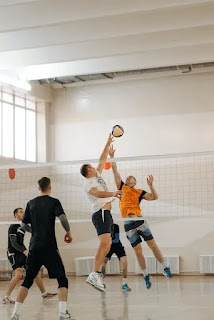A well-liked team sport that is performed all around
the world is volleyball. It is a quick-moving, high-intensity game that calls
for talent, cooperation, and strategy. William G. Morgan, a physical education
teacher in Massachusetts, USA, created volleyball in 1895. Since then, it has
gained popularity and been accepted as an Olympic sport, being played both
competitively and recreationally.
The fundamentals of volleyball are straightforward. On
a rectangular court separated by a net, two teams of six players each
participate. The goal is to make the ball contact the ground inside the lines
of the other team's court by launching it over the net and into their court.
The team that scores 25 points first in a set wins that set, and the match is
won by the side that prevails in the best-of-five sets. The game is played in
sets.
A mix of physical and mental talents are needed for
volleyball. To compete successfully on the court, players require strong
hand-eye coordination, agility, speed, and strength. Also, they need to be able
to effectively communicate, think strategically, understand their opponents,
and respond rapidly to changing circumstances.
Volleyball is a unique sport in that it is a real team
sport in which no one player dominates the match. To accomplish their
objectives, the players on the court must cooperate with one another. Each
player has a certain job to perform. As a result, volleyball is an excellent
approach to develop these abilities both on and off the court.
Another excellent kind of exercise is volleyball. It
is a vigorous activity that can enhance general fitness levels, cardiovascular
health, and muscle strength. It may also be practiced by people of all ages and
fitness levels because it is a comparatively low-impact activity.
In conclusion, volleyball is a pleasant and exciting
activity that helps players of all skill levels in a variety of ways.
Volleyball offers the chance for social contact, cerebral stimulation, and
physical health whether it is played recreationally or competitively. The
sport's widespread appeal is evidenced by the fact that it is so exciting and
energetic.
Grounds of Volleyball
The volleyball court is the playing area where the
match is played. A net divides the volleyball court's rectangular space into
two equally sized half. There are some common measures that are utilized at
most levels, although the court's size and the height of the net vary depending
on the level of competition and the regulating organization.
The typical volleyball court is 9 meters wide and 18 meters
long. A net that is 2.43 meters high for men's tournaments and 2.24 meters high
for women's events separates the court into two half. The center line, which
divides the court into two equal half, lies precisely above the position of the
net.
The court is further separated by distinct zones, each
with its own name and function. Attacking players are positioned in the front
zone, while defenders are positioned in the back zone. The attack line is a
line that delineates the most distance that back row players may leap while
attacking the ball, whereas the service zone is where the serving player stands
to start play.
Sand, synthetic materials, and hardwood are just a few
examples of the materials that can be used to construct the volleyball court's
playing surface. The level of play and court location influence the type of
surface that is utilized.
There are volleyball courts everywhere, including
indoor gyms, outdoor parks, and beaches. As volleyball is a game that can be
put up and played in a number of situations, its popularity has been boosted by
the accessibility of volleyball courts.
In conclusion, the volleyball court's different zones
and limits make up the playing area. A net separates the normal volleyball
court's 18 by 9-meter surface area into two equally sized half. Depending on
the level of play and the court's location, the kind of court and the height of
the net may change. Despite these alterations, the game's rules are unchanged,
and playing volleyball continues to be thrilling and challenging.



.png)



0 Comments